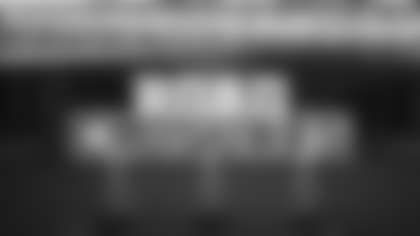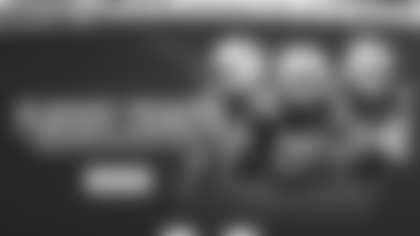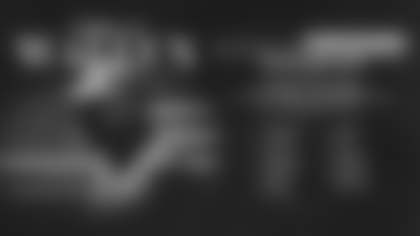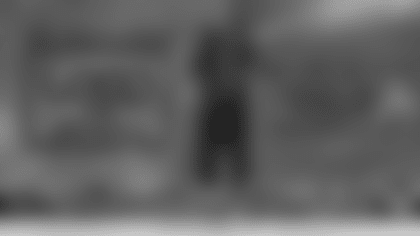First of a Two-Part Look at New Colts Defensive Coordinator Larry Coyer
INDIANAPOLIS – For Larry Coyer, this is about more than football.
Coyer, hired recently as the Colts' defensive coordinator, said there obviously were plenty of on-field reasons to join an organization that featured four players on defense who have made the Pro Bowl, including one – safety Bob Sanders – who was the consensus NFL Defensive Player of the Year in 2007.
But that was only part of the reason he took the job, he said recently.
"It's personal as much as professional," Coyer said.
The personal part is his relationship with Colts Head Coach Jim Caldwell, who hired Coyer shortly after taking over as head coach this past January and who played for Coyer when the latter was the defensive coordinator at the University of Iowa.
"He and I have had a long history," said Caldwell, who played for Coyer at Iowa from 1974-1976 and coached under him as a graduate assistant in 1977. "We go back a long way."
Caldwell said knowing that history, and having followed Coyer's career since the mid-1970s, helped him trust that Coyer was the right person to lead a defense that has finished in the Top 11 in the NFL five times in the last seven seasons.
"He's been coaching for 45 years or so," Caldwell said. "With just his presence, he'll bring an attitude along with him."
Coyer, who served the past two seasons as the assistant head coach with the Tampa Bay Buccaneers, spent the previous seven seasons with the Denver Broncos, the last four as the defensive coordinator.
Coyer in February replaced Ron Meeks, who spent 2002-2008 as the Colts' defensive coordinator before taking the same position with Carolina. All other members of the Colts' defensive staff returned, a group that includes defensive line coach John Teerlinck, defensive backs coach Alan Williams, linebacker coach Mike Murphy and special assistant Rod Perry.
Coyer was asked in February if there were a concern with working with a staff already in place.
"I don't ever worry about that," Coyer said. "We're a team. We're professionals. I don't think a coordinator is a dictator. I think a coordinator is what it says. He takes a combination of ideas from intelligent people and puts them to use in an intelligent way. There are a lot of different ways to do it and what I'm trying to do is use all the intelligence on our staff, which is vast.
"You take all that experience and put it together and you use it. What you come out with is a product that we all agree on. I don't see a coordinator as a dictator. I see it as an organizer to bring ideas together and then put them into place. I think my job is to make sure that we're organized."
Said Caldwell, "He'll work well with the staff that's in place, and I think people will enjoy what you see from him."
Caldwell has said in recent weeks that as much as Coyer's experience and knowledge, it was his intangibles the most led to his hiring. Those are intangibles Caldwell said he knows from their past relationship, and from watching Coyer's teams.
Three decades after their time together, Coyer said his love of the game hasn't waned.
"I'm passionate about football," Coyer said. "I've been blessed. I've been coaching football since 1965. That's what I want to do. That's my goal. That's all I've ever wanted to do, and I'm passionate about it, I love it. I prefer to be enthusiastic, positive. I hope our guys are passionate about it, enthusiastic and positive. I want to talk about what we can do, not what we can't do, how we can get better and not why we made a mistake. Correct the mistake and, 'How can we get better?'
"That's how I feel about it. I'm eager for challenges. I like challenges. I like to compete."
And just as much, he said, he likes the idea of coaching for someone with whom he shares an extensive and intimate history.
"I am really honored to be here with Jim Caldwell," Coyer said. "He's an ultimate character guy, and he proved it in 1976 against Penn State. That was when they were really good and Iowa was really bad, and we were in the transition of trying to build a football team. We had to go over there and play that '76 Penn State team, and he stood up—this is a quiet man; Jim Caldwell is a quiet man—and talked about that nobody can make you feel inferior.
"He did it in such a way that was unbelievable, how he talked to our football team. And we beat that team, 7-6. One of the greatest displays of defensive courage I've ever seen. That's the kind of guy he was. He was about character and he was about fighting and he was about establishing his way of doing things in a quiet way.
"I respect that and that's why I'm honored to work with him, because I know what he's going to do and I know he's going to be straight up and straight at you."














